|
|
|
Sort Order |
|
|
|
Items / Page
|
|
|
|
|
|
|
| Srl | Item |
| 1 |
ID:
146783
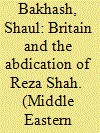

|
|
|
|
|
| Summary/Abstract |
On the eve of the Anglo-Soviet invasion of Iran in the Second World War, Sir Reader Bullard, the British minister in Tehran, urged on his government the desirability of removing the Iranian ruler, Reza Shah, from office. Association with the ‘universally detested’ shah, whom he described as a ‘greedy ignorant savage’, was detrimental to Britain's interests and its war effort. In the weeks that followed the Anglo-Soviet occupation of Iran, Bullard continued to press for and to shape the ultimate British decision to force Reza Shah to abdicate and go into exile. Yet, this was not always Bullard's view of Britain's relationship with the Iranian ruler. When he presented his credentials 20 months earlier, Bullard described it as his ‘urgent duty’ to win Reza Shah's favour. Nor did Bullard's insistence that Britain depose the Shah initially find favour with the Foreign Secretary, Anthony Eden, his Middle East staff at the Foreign Office, or with Churchill. This article traces the evolution of Bullard's own view of Reza Shah and the developments that led the Foreign Office, initially eager to win Reza Shah's favour and even ready to offer Reza Shah a ‘substantial bribe’ for his cooperation, to take steps to topple Reza Shah from the throne.
|
|
|
|
|
|
|
|
|
|
|
|
|
|
|
|
| 2 |
ID:
118262
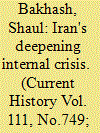

|
|
|
|
|
| Publication |
2012.
|
| Summary/Abstract |
[Thirty-three] years after the revolution, Iran's ruling elite is still unable to resolve differences on policy and the country's future direction through negotiation and compromise.
|
|
|
|
|
|
|
|
|
|
|
|
|
|
|
|
| 3 |
ID:
179793
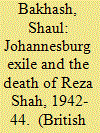

|
|
|
|
|
| Summary/Abstract |
Reza Shah spent the last two years of his life in exile in Johannesburg, being allowed to relocate after several unhappy months on the island of Mauritius. He was more content in Johannesburg than in Mauritius. He took walks, was impressed by the broad avenues, the orderliness of the people and the presence of women in the workplace. He was able to receive visits from family members in Iran. However, problems remained. His sons were not getting a proper education. The royal family remained under British control. Colour bar problems arose regarding housing. Reza Shah grew restless, more reclusive, perhaps sensing he was nearing his last years. He asked repeatedly to move to a country nearer to Iran. But the British, believing it harmful to their interests to have Reza Shah anywhere near Persia, adamantly refused. In July 1944, Reza Shah suffered a massive, fatal heart attack, ending his long, unhappy exile. This article recounts the final years of a once powerful, much-feared autocrat reduced, due to the exigencies of war, to a humiliating exile in foreign lands and under conditions dictated not by himself but by an imperial power from whose influence he had strived to free Iran.
|
|
|
|
|
|
|
|
|
|
|
|
|
|
|
|
| 4 |
ID:
154874
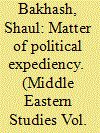

|
|
|
|
|
| Summary/Abstract |
When Reza Shah, the former ruler of Iran, died in exile in Johannesburg, South Africa, in 1944, he left some £110,000 in cash in his bank account and valuables and other items worth another £20,000. But he left no will; and the Union government proceeded to impose a tax amounting to over £43,000 (one-third of the total value) and to distribute the remainder among heirs as specified in Union law for persons who had died intestate. Reza Shah's son, Mohammad Reza Shah, the ruling Iranian monarch, hard up for money, fought these requirements. He claimed everything in his late father's possession was his, and that neither estate taxes nor distribution to heirs applied. A four-year battle over the estate ensued. It was eventually resolved, but only after vigorous efforts by two British ambassadors to Tehran, endeavours at the highest levels of the British government; the involvement of the South African prime minister and, finally, an act of the South African parliament. This article examines the intricate tug-of-war surrounding the settlement of the estate of Reza Shah and what it tells us about the principal parties involved.
|
|
|
|
|
|
|
|
|
|
|
|
|
|
|
|
| 5 |
ID:
190324
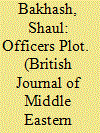

|
|
|
|
|
| Summary/Abstract |
In November, 1942, during the Anglo-Russian occupation of Iran in World War II, the British discovered the secret home of Franz Mayer, the undercover German political intelligence agent and spy for whom they had long been looking. Mayer had left behind a cache of documents providing, among other matters, the identities of a number of high-ranking Iranians in the military, police and public officer working with him on a plan for an uprising against the occupation to coincide with the arrival of German troops in the Caucasus and at Iran’s door. This article examines the nature of the German plot, the activities of German agents and their Iranian collaborators in Iran during the war, the debate among British officials as to how to deal with the Officers Plot, and the eventual dismantling of the German fifth column. The article also examines the shift taking place in great-power influence in Iran and the differences between Britain and the United States over addressing the German conspiracy.
|
|
|
|
|
|
|
|
|
|
|
|
|
|
|
|
| 6 |
ID:
073715
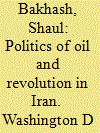

|
|
|
|
|
| Publication |
Washington D C, Brookings, 1982.
|
| Description |
37p.
|
| Standard Number |
0815707819
|
|
|
|
|
|
|
|
|
|
|
|
Copies: C:1/I:0,R:1,Q:0
Circulation
| Accession# | Call# | Current Location | Status | Policy | Location |
| 022414 | 338.27282/BAK 022414 | Main | On Shelf | Reference books | |
|
|
|
|
| 7 |
ID:
073085


|
|
|
|
|
| Publication |
London, I B Tauris, 1985.
|
| Description |
x, 282p.hbk
|
| Standard Number |
1850430039
|
|
|
|
|
|
|
|
|
|
|
|
Copies: C:1/I:0,R:0,Q:0
Circulation
| Accession# | Call# | Current Location | Status | Policy | Location |
| 025924 | 955.054/BAK 025924 | Main | On Shelf | General | |
|
|
|
|
| 8 |
ID:
166641


|
|
|
|
|
| Summary/Abstract |
On September 16, 1941, three weeks after British and Soviet troops invaded Iran in the Second World War and occupied the country, Reza Shah abdicated the throne in favor of his son, quit Iranian soil and boarded a British ship to go into exile. The British refused to allow Reza Shah to choose his own place of exile (South America) and sent him to the island of Mauritius. This article examines British thinking that resulted in the choice of Mauritius as the place of exile. It traces Reza Shah’s journey across Iran as he prepared to leave the country; details the composition of the large party of family and staff that accompanied him; provides an account of Reza’s Shah’s reminiscences and reflections at this difficult and emotion-laden moment when he was forced to surrender power, and describes the ‘stooped and aged man’ he had become. It ends with the arrival of the ship carrying Reza Shah and the royal party in Mauritius.
|
|
|
|
|
|
|
|
|
|
|
|
|
|
|
|
| 9 |
ID:
165743
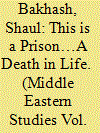

|
|
|
|
|
| Summary/Abstract |
Reza Shah, the feared and powerful master of Iran for nearly two decades, spent the last years of his life in lonely exile, on the island of Mauritius, then in South Africa. His life in exile was hardly a happy one. The place and conditions of his exile were dictated not by himself but by the British, and the relationship between the two remained uneasy. Britain’s handling of Reza Shah – the degree and freedom and choice they were prepared to allow him and his family – were determined by the exigencies of war. Reza Shah sought to loosen the bonds of British control. In Tehran, his son and successor, Mohammad Reza Shah, also played a role. He used what leverage he had with the British to help ease the conditions of his father’s exile, while he endeavored to protect Iran’s interests under a difficult foreign occupation. The push-and-pull of cross-purposes entailed by this triangular relationship defined Reza Shah’s life in exile in both Mauritius and Johannesburg. This article examines the Mauritian period of his exile.
|
|
|
|
|
|
|
|
|
|
|
|
|
|
|
|
| 10 |
ID:
157839
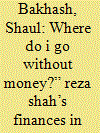

|
|
|
|
|
| Summary/Abstract |
When Reza Shah died in exile in Johannesburg, South Africa, in July 1944, he left in his account at Barclays Bank a deposit of £110,000, a considerable amount of money. Yet when he went into exile only three years earlier, Reza Shah feared he would be hard-pressed for money, if not left altogether destitute—and with good reason. He left Iran with a “horde” of progeny, family members and retainers. Before departing, he had ceded all his enormous wealth in cash and property to his son and successor. He did not remain destitute for long. His son, the new shah, continued to send him money, and for a while the British paid for a major part of his upkeep. Yet his money anxieties did not cease. This article describes and follows the winding trail of Reza Shah’s finances in exile.
|
|
|
|
|
|
|
|
|
|
|
|
|
|
|
|
|
|
|
|
|